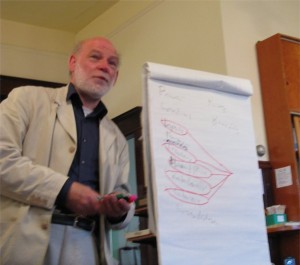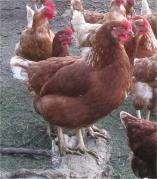 I was at a small and far too short evening with British food activist Geoff Tansey the other night. He was on holiday but kindly agreed to stop in at the Victoria Quakers meeting house to give up a couple of hours talking to local people interested in food issues, and we were treated to a mini-version of the presentations he’s been give at conferences in Nova Scotia and Montana this month.
I was at a small and far too short evening with British food activist Geoff Tansey the other night. He was on holiday but kindly agreed to stop in at the Victoria Quakers meeting house to give up a couple of hours talking to local people interested in food issues, and we were treated to a mini-version of the presentations he’s been give at conferences in Nova Scotia and Montana this month.
About 20 of us gathered on a quiet evening when much of the population was tucked up in front of its televisions watching hockey. We started off with a short review of our various breakfasts: the cereals, eggs, breads and fruits were all, noted Tansey, the historical residue of European colonial trade, not local (aside from the salmon that one person had had) – relics, really, of the food systems created by colonial powers that are all on the wane today. And a reminder that food lays its historical tracks down our lives whether we notice or not.
Next it was on to the pillars of food politics. There are always four elements that affect contemporary food systems: power, control, risk and benefit. Power and control contain risks and benefits; understanding who benefits and whose interests are put at risk by the current system is one way of revealing flaws in the structure. Food security definitions, Tansey remarked, do tend to omit mention of power, control and biosphere issues.
He spoke about the economic concentration of power in our food systems which works against broader human interests: there’s a widening gap between the 10% of the world population which holds 80% of global wealth. The wealthy minority will carry on practising what he calls Liddism (keeping a lid on) where the fundamental truths are that we’re living in a bitterly divided adn finite world.
It’s important to acknowledge how greatly technology affects our food system as well, from genetic engineering of food products to customer profiling cards that drive the control of the food products we’re offered.
If we carry on as we are today, Tansey sees three options for global food in the future.
1. The system simply collapses.
2. There’s a technological fix, leading to what he calls an era of corporate feudalism: the rich minority doing all in their power to hold their position at the expense of everyone else.
3. Diversity/equity systems bring a more universal food system into play. There’s a lot of work being done now, but it’s often not very connected.
The tech fix might have a role to play, he added, but only if it aims to meet the goal of diversity/equity. Unfortunately what it’s aiming for right now is economic power and control which simply widens the gap between rich and poor.
There was more discussion after that during which he talked about his recent book, The Future Control of Food: A Guide to International Negotiations and Rules on Intellectual Property, Biodiversity and Food Security. Also about the Food Justice Report of the Food Ethics Council which provides tools for decision makers and is available as a pdf download on the web. And he recommended Thinking in Systems by Donella Meadows.
He mentioned Manitoba film-maker Katharina Stieffenhofer (whose film …And This is My Garden “is about the power of education to foster healthier lifestyles and to reconnect youth to the earth”) in the context of concerns over the future of the Canadian Wheat Board, the farmer-controlled marketing agency that sells Canadian wheat, durum and barley on world markets, and which Stephen Harper has sworn to dismantle.
Harper thinks he has a mandate to take away the power over wheat marketing from its farmers, so please read all about it in Maclean’s. Then consider the pillar of control, and who his “free trade” solution will really benefit. And if you don’t think it’s going to help make food available more fairly and widely, write to him and to the agriculture minister and tell them what you think.










2 Responses to Tansey on food, wealth gaps and the Canadian Wheat Board